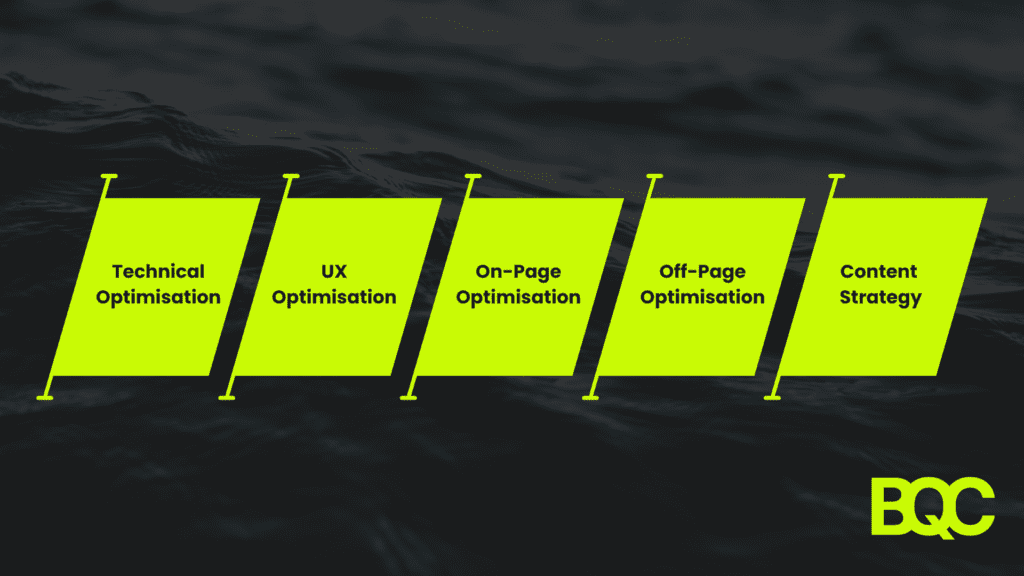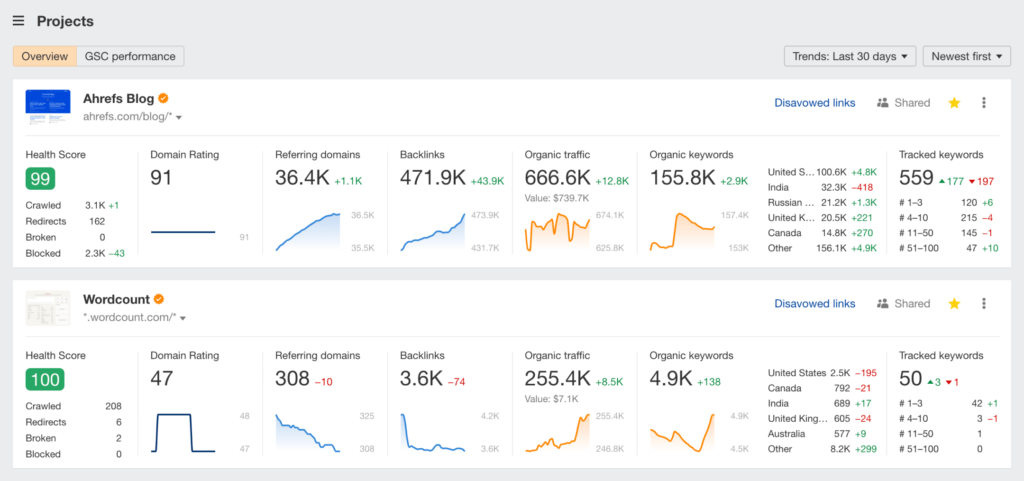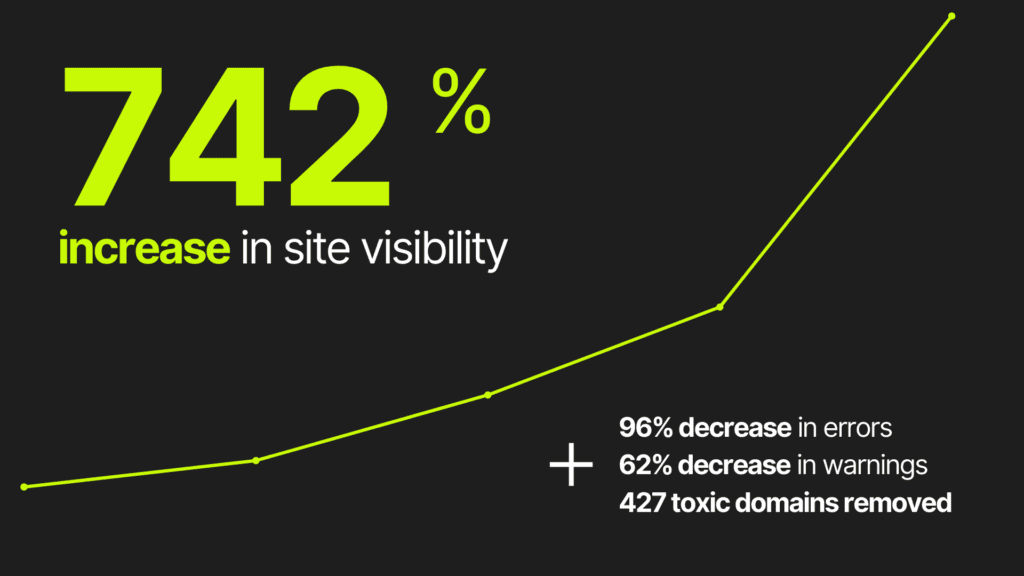Your website’s performance in search engine rankings can make or break your online success.
Technical SEO expertise plays a crucial role in this. It’s the backbone of your website’s health and its visibility to search engines.
But what exactly is technical SEO?
How does it differ from other SEO types?
How can you leverage it to maximise your SEO results?
We’ll examine the importance of technical SEO, the process of conducting a technical SEO audit, and the benefits of hiring an SEO consultant or company.
We’ll also explore the UK market’s specific context, providing insights relevant to businesses operating in this region.
Understanding Technical SEO and Its Significance
Technical SEO refers to optimising your website for the crawling and indexing phase. It’s about improving your site’s infrastructure so search engines can better understand and rank it.
This type of SEO does not involve the website’s content or promotion. Instead, it focuses on site speed, mobile optimisation, and secure connections.
It’s crucial for your website’s health. It ensures that search engines can easily access, crawl, index, and interpret your website. Without it, even the best content may remain hidden from search engines. This can lead to lower rankings and less organic traffic.
The Pillars of SEO: Technical, On-Page, and Off-Page
SEO is often divided into three main pillars: technical, on-page, and off-page SEO.
Technical, as we’ve highlighted, involves optimising your website’s infrastructure. It’s the foundation upon which the other two pillars stand.
On-page SEO focuses on optimising the content on your website. This includes keyword optimisation, meta tags, headers, and content quality.
Off-page SEO, on the other hand, involves activities that happen outside your website. This includes link building, social media marketing, and influencer outreach.
Why Technical SEO is a Game Changer for Your Website
The technical aspects of SEO can significantly impact your website’s performance. It can make your site faster, easier to navigate, and more understandable to search engines.
A well-optimised website provides a better user experience. This can lead to higher engagement rates, lower bounce rates, and ultimately, higher rankings in search engine results.
Moreover, technical SEO can give you a competitive edge. Many businesses overlook this aspect of SEO, focusing only on content and links. By investing in technical SEO, you can stay ahead of your competitors.
Finally, technical SEO is essential for mobile optimisation. With mobile-first indexing, Google now considers the mobile version of your website for ranking and indexing. Without a mobile-optimised site, you risk losing a significant amount of traffic.
Conducting a Technical SEO Audit: A Step-by-Step Guide
A technical SEO audit is a comprehensive examination of your website’s technical health. It helps identify issues that could be hindering your site’s performance in search engine rankings.
The first step in conducting a technical SEO audit is to crawl your website. This process involves using a tool to simulate how search engines crawl your site. It helps identify broken links, missing meta tags, and other issues.
Next, check your website’s speed. Slow-loading pages can frustrate users and lead to higher bounce rates. Use a tool like Google’s PageSpeed Insights to identify areas for improvement.
Common Technical SEO Issues and How to Resolve Them
There are several common technical SEO issues that can affect your website’s performance.
Here are a few, along with tips on how to resolve them:
- Slow page speed: Optimise images, enable compression, and reduce server response time.
- Mobile unfriendliness: Use a responsive design that adapts to different screen sizes.
- Duplicate content: Use canonical tags to tell search engines which version of a page to index.
- Broken links: Regularly check for and fix broken links to improve user experience and SEO.
- Missing meta tags: Ensure each page has a unique title tag and meta description.
- Incorrect indexing: Ensure that search engines are indexing the correct pages by regularly reviewing your site’s coverage in Google Search Console and addressing any unexpected exclusions or inclusions.
- Missing or Incorrect Robots.txt: Create and maintain a properly formatted robots.txt file to guide search engines on which parts of your site to crawl and index, preventing undesirable content from appearing in search results.
- Not Enough Use of Structured Data: Implement structured data markup (such as Schema.org) to provide search engines with additional context about your content, potentially enhancing your appearance in search results with rich snippets and other features.
- No HTTPS Security: Secure your website with HTTPS to protect user data and build trust, as search engines favour encrypted connections and may penalise sites without HTTPS.
- Incorrect Rel=Canonical: Properly implement rel=canonical tags to indicate the preferred version of a page when duplicate content exists, preventing search engines from indexing the wrong version and diluting your rankings.
Each of these issues can negatively impact your website’s SEO. By identifying and resolving them, you can improve your site’s performance and rankings.
Tools of the Trade: Essential Software for Technical SEO
There are several tools that can help you with your technical SEO efforts. Here are a few:
Google Search Console: This free tool from Google provides insights into how your site is performing in search results.
Screaming Frog: This website crawler can identify technical issues like broken links and missing meta tags.
SE Ranking: This all-in-one SEO tool offers a technical SEO audit feature, among other functionalities.
GTmetrix: This tool analyses your site’s speed and provides recommendations for improvement.
Ahrefs: This tool allows you to research your competitors, find traffic-driving keywords, build quality backlinks & more.
These tools can provide valuable insights into your website’s technical health. By leveraging them, you can identify and resolve issues that could be hindering your SEO performance.
The Role of a Technical SEO Consultant
A technical SEO consultant is a specialist in optimising websites for search engines. They focus on the technical aspects of SEO, such as site speed, mobile optimisation, and crawlability.
These experts conduct technical SEO audits to identify issues. They then provide recommendations for improving your website’s technical health. This can lead to better search engine rankings and more organic traffic.
Technical SEO consultants also stay updated on the latest SEO trends and algorithm updates. This knowledge allows them to provide the most effective strategies for your website.
In short, a technical SEO consultant can be a valuable asset in improving your website’s performance. They can provide the expertise needed to navigate the complex world of technical SEO.
When to Hire a Technical SEO Audit Consultant
Knowing when to hire a technical SEO audit consultant can be tricky. Here are some signs that it might be time:
If your website’s organic traffic has been declining, it could be due to technical SEO issues. A consultant can help identify and resolve these problems.
If you’re planning a website redesign or migration, a technical SEO consultant can ensure the process goes smoothly. They can help prevent issues that could negatively impact your SEO.
If you’re struggling to understand technical SEO, hiring a consultant can be beneficial. They can provide the expertise needed to optimise your website effectively.
In short, if you’re facing challenges with technical SEO, hiring a consultant can be a wise decision.
Choosing the Right Technical SEO Company or Consultant
Selecting the right technical SEO company or consultant is paramount for your website’s success. The right choice can significantly impact your site’s visibility, user experience, and overall performance. Here are key factors to consider and why they are essential:
Experience: A consultant with a robust track record in technical SEO demonstrates their ability to navigate the complex landscape of search engine algorithms. Their past successes indicate that they understand what strategies work best and can adapt to the ever-changing SEO environment. Experience is not just about years in the industry; it’s about the depth of knowledge and the ability to solve intricate SEO challenges effectively.
Expertise: SEO is a broad field, but technical SEO requires specialised skills. Ensure the consultant possesses in-depth knowledge of aspects such as site architecture, page speed optimisation, mobile-friendliness, and structured data. Their expertise should extend to understanding how these elements influence search engine crawlers and ultimately, your site’s ranking. A highly skilled consultant can identify and rectify issues that might not be apparent, ensuring your website is fully optimised for search engines.
Reviews and Testimonials: Client reviews and testimonials provide insight into the consultant’s reliability and effectiveness. Positive feedback from previous clients is a strong indicator of their ability to deliver results.
Communication: Clear and regular communication is vital for a successful partnership. SEO projects can be complex and require constant updates and adjustments. A consultant who communicates effectively ensures you are always informed about progress, challenges, and changes. Good communication fosters transparency, which builds trust and ensures that both parties are aligned on goals and expectations.
Pricing: Budget considerations are crucial, but the focus should be on value rather than just cost. Ensure the services and SEO packages offered align with your budget, but also consider the return on investment. A higher initial cost might be justified if the consultant can deliver significant improvements in your site’s performance and revenue. Be wary of services that seem too cheap; they almost always cut corners or employ black-hat techniques that could harm your site in the long run. SEO is not an overnight success, it takes skill, expertise and patience.
By considering these factors, you can choose a technical SEO consultant who can effectively improve your website’s performance.
Case Studies: Success Stories of Technical SEO Implementation
Case studies provide valuable insights into the effectiveness of technical SEO. They show how businesses have improved their website performance and search engine rankings.
For example, we worked with a UK-based e-commerce company and saw a significant increase in organic traffic after implementing technical SEO. We optimised their site speed, mobile usability, and structured data. This led to better visibility in search engine results with a higher conversion rate, leading to increased online sales.
Working through weekly SEO consulting calls with another client, we’ve fostered a strong partnership that not only keeps their strategy on track but also enhances their understanding of SEO and its long-term benefits.
These weekly calls are more than just status updates; they are strategic sessions designed to ensure every aspect of their SEO plan is meticulously executed and adapted to the latest trends and algorithm changes. During these calls, we cover several critical areas:
Progress Review: We start by reviewing the past week’s progress, analysing key metrics, and discussing any roadblocks. This ensures that our strategies are performing as expected and allows us to make data-driven decisions for future actions.
Education and Insights: SEO can seem like a labyrinth of technical jargon and complex strategies. Our calls serve as a platform to demystify these concepts. We explain the rationale behind each tactic, how it fits into the overall strategy, and the anticipated impact. This educational component empowers them to make informed decisions and appreciate the nuances of SEO.
Strategic Adjustments: During our calls, we assess the need for any strategic adjustments. Whether it’s a tweak in keyword focus, a shift in content strategy, or a new technical optimisation, these sessions ensure we are always a step ahead.
Technical and Content Guidance: While we handle the heavy lifting of technical SEO, we guide them on tasks they can manage, such as content creation and on-page optimisations. This collaborative effort ensures that the client is actively involved, creating a cohesive and comprehensive approach to SEO.
Building SEO Knowledge and Involvement: One of the most rewarding outcomes of our weekly calls is witnessing the growth in their SEO knowledge. Over time, they have developed a deeper understanding of how SEO works, why certain tasks are prioritised, and the long-term value these efforts bring to their business. This knowledge translates into more effective collaboration and a shared vision for success.
Increased ROI: The combination of technical SEO improvements and engaging content has not only boosted their visibility but also contributed to a higher return on investment through increased conversions and sales.
These weekly SEO consulting calls exemplify the collaborative spirit and mutual growth that define our approach and ethics at BQC. By keeping the strategy on track, educating the client, and working together on key tasks, we’ve built a foundation for sustained SEO success.
Measuring the Impact of Technical SEO
Measuring the impact of technical SEO can be challenging. It involves tracking a variety of metrics and understanding their significance.
Key metrics are visibility (search impressions) and organic traffic. An increase in organic traffic often indicates successful technical SEO. It shows that your website is ranking higher in search engine results.
Another important metric is crawl errors. These errors can prevent search engines from indexing your website. By reducing crawl errors, you can improve your website’s visibility.
Finally, page load time is a crucial metric. Faster page load times can improve user experience and SEO. They can lead to higher engagement and conversion rates.
In summary, measuring the impact of technical SEO involves tracking a variety of metrics. By understanding these metrics, you can assess the effectiveness of your technical SEO efforts.
The Future of Technical SEO: Trends to Watch
The field of technical SEO is constantly evolving. New trends and technologies are continually emerging.
One trend to watch is the rise of voice search. As more people use voice assistants, optimising for voice search is becoming increasingly important. This involves using structured data and long-tail keywords.
Another trend is the increasing importance of mobile optimisation. With mobile-first indexing, having a mobile-friendly website is crucial. This involves optimising site speed, usability, and structured data for mobile devices.
AI is also influencing technical SEO. Search engines are using AI to understand and rank websites. This means that technical SEO needs to adapt to these changes.
In conclusion, the future of technical SEO is exciting and dynamic. By staying updated with these trends, you can ensure that your website stays competitive.
Wrapped: Integrating Technical SEO into Your Overall Strategy
Technical SEO is a crucial part of any successful SEO strategy. It ensures that your website is accessible, crawlable, and understandable to search engines.
However, technical SEO is not a one-time task. It requires ongoing monitoring and optimisation. This is where a technical SEO consultant or company can provide valuable expertise.
In conclusion, technical SEO is not merely a component of a successful SEO strategy, but its very foundation. It provides the essential infrastructure that allows search engines to effectively crawl, index, and rank your website. By ensuring your website is accessible, understandable, and optimised for both search engines and users, technical SEO sets the stage for improved search rankings, increased organic traffic, and ultimately, greater online success.
However, the work of technical SEO is never truly finished. Search engine algorithms evolve, user behaviours change, and your website itself will grow and develop. Ongoing monitoring, optimisation, and adaptation are key to maintaining and improving your technical SEO performance. Consider partnering with a skilled technical SEO consultant or company to navigate the complexities and stay ahead of the curve.
Ultimately, by integrating technical SEO into your overall digital strategy and recognising its ongoing importance, you can unlock your website’s full potential, achieve lasting visibility in search engine results, and drive sustainable growth for your business.







